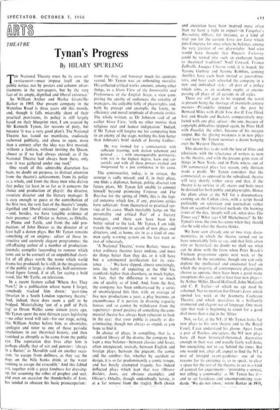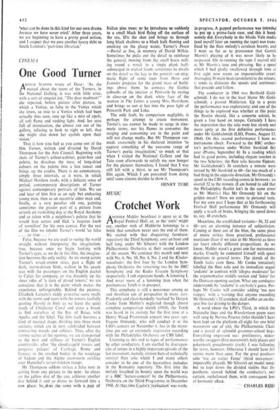Tynan's Progress
THEATRE
By HILARY SPURL1NG
HE National Theatre must be its own ad- I vertisenzent—must impose itself on the public notice, not by posters and column adver- tisements in the newspapers, but by the very fact of its ample, dignified and liberal existence.' So William Archer and Harley Granville- Barker in 1903. Our present company in the Waterloo Road is three years old this month; and, though it falls miserably short of their practical provisions, its policy is still largely based on their blueprint (not, I am assured by Mr Kenneth Tynan, for reasons of piety, but because 'it was a very good plan'). The National Theatre has issued no manifesto, studiously eschewed publicity, and chose to open, more than a century after the idea was first mooted, 'without a fanfare, without inviting the Queen, almost as if we had always existed; as if the National Theatre had always been there, only now it was gathered under one roof.'
One result of this admirable discretion has been, no doubt on purpose, to distract attention from the theatre's achievement, from its policy as a whole, and from the three men who dictate that policy (at least in so far as it concerns the choice and production of plays): the director, associate director and the literary manager. It is easy enough to guess at the contribution of the first two, the very fact of the theatre's 'ample, dignified and liberal existence' speaks for them —and, besides, we have tangible evidence of their presence: of Olivier as Astrov, as Othello, as Plume and Tattle, and from the odd pro- duction; of John Dexter as the director of at least half a dozen plays. But Mr Tynan remains something of an enigma: editor of those in- structive and austerely elegant programmes; the self-effacing author of a number of production- journals; compiler (according to rumour which turns out to be correct) of an unpublished short- list of all plays worth the name which world drama has produced; he is still, in the imagination of the public at large, a shadowy, half-unremem- bered figure famed, if at all, for saying a bold word, like Mr Tattle, on television.
In a recent feature called 'Where Are They Now?,' in a publication whose name I forget, somebody tracked him down: 'part-time librarian in a South London repertory theatre.' And, indeed, there does seem a gulf to be bridged. Materialising 'out of a puff of Paris fog' to Orson Welles some sixteen years ago, Mr Tynan spent the next thirteen years legislating —no other word will suit—for our stage, acting, like William Archer before him, as chronicler, apologist and tutor to one of those periodic revolutions in our theatrical history, and then vanished as abruptly as he came from the public eye. The reputation that lives after him is perhaps chiefly that of wit and punster: 'always in a fluster,' as Meredith said on another occa- sion, 'to escape from dullness, as they say the dogs on the Nile banks drink at the water running to escape the crocodile.' And this fabled Wit, together with a great fondness for dressing- up, for assuming the robes of prophet and seer, and even on occasion the thunderbolts of Jove, has tended to obscure his basic preoccupation: from the first, and however much his opinions veered, Mr Tynan was an unbending moralist. His collected critical works amount, among other things, to a Short View of the Immorality and Profaneness of the English Stage, a view com- prising the apathy of audiences, the venality of managers, the culpable folly of playwrights, and, both by precept and example, the laxity, in- efficiency and moral turpitude of dramatic critics. The whole written, as Dr Johnson said of an earlier Shon View, 'with no other motive than religious zeal and honest indignation.' Indeed, if Mr Tynan will forgive me for comparing him to an enemy of the stage, nothing fits him better than Johnson's brief sketch of Jeremy Collier: He was formed for a controvertist; with sufficient learning; with diction vehement and pointed . . . ; with unconquerable pertinacity; with wit in the highest degree, keen and sar- castick; and with all these powers exalted and invigorated by a just confidence in his cause.
The controvertist, today, is in retreat, the scourge is sadly missed; and if, in their place, one finds a diplomat, benign, politic, discreet (on future plans, Mr Tynan felt unable to commit himself beyond promising Volpone and The Bacchae for the spring of 1968), this is the logi- cal outcome which few, if any, previous critics have achieved: from theoretical to practical ser- vice of his cause. Much inevitably hangs on 'the personality and critical flair' of a literary manager, and there can have been few better suited to the task. Mr Tynan, I am told, travels the continent in search of new plays and directors, and, at home, sits in as a kind of one- man early warning system on the last week or two of rehearsals.
'A National Theatre,' wrote Barker, 'must do what ordinary theatres leave undone, and must do things better than they do, or it will have but a sentimental justification for its exis- tence. . . .' We have slipped, almost unwittingly, into the habit of expecting at the Old Vic standards higher than elsewhere, so much higher, in fact, that the difference is not so much one of quality as of kind. And, from the first, the company has been embarrassed by a series of unanticipated hits (for, with an average of five new productions a year, a play becomes an encumbrance if it persists in drawing capacity houses and so cannot be withdrawn from the repertory)—proof positive of something the com- mercial theatre has always been reluctant to look in the eye: that your public is exactly as dis- criminating, though not always as stupid, as you hope to find it.
In choice of plays, in compiling, that is, a standard library of the drama, the company has kept a nice balance—between classics and lesser, often unexpected, revivals, between English and foreign plays, between the piquant, the comic and the sombre—for, whether by accident or design, it is so far predominantly a comic troupe, and has barely attempted tragedy, has indeed deflected plays which lean that way (Master Builder, Juno, are obvious examples; and Olivier's Othello, though undoubtedly heroic, is
at a far remove from the tragic). Both choice . _
and execution have been inspired more often than we have a right to expect—in Farquhar's Redlining Officer, for instance, as a kind of trial run for the current Love for Love which puts Congreve for once %%here he belongs, among the very greatest of our playwrights. And who would have thought that Pinero's Trelawny could be turned into such an exuberant hymn to theatrical tradition? Noel Coward, Franco Zeffirelli, Jacques Charon (and, it is hoped, Sir Tyrone Guthrie and Jerome Robbins, coming shortly), have each been invited as guest-direc- tors, and have each schooled the company in a new and individual st0e: all part of a policy which aims, as an academy ought, at encom- passing all plays of all periods in all styles.
There are till gaps to be stopped, the worst at present being the shortage of twentieth-century masters—Pirandello (pipped at the post by Bernard Miles with Right You Are If You Think So); and Brecht and Beckett, comparatively neg- lected with one play apiece—the one, because of copyright difficulties (pipped again, by Peter Hall with Putui/a). the other, because of his meagre output. But thz glaring weakness is in new plays —and here Mr Tynan surmises a doom hanging over the Western Theatre.
This doom has to do with the lure of films and television, with the reluctance of writers to turn to the theatre, and w ith the present grim state of things in New York, and in Paris where, out of 130 commercial plays last season, only thirteen made a profit.. Mr Tynan considers that the commercial, as opposed to the subsidised, theatre will very shortly wither away and that, if the theatre is to survive at all, snares and baits must be devised for both public and playwrights. Hence the plans afoot at the NT for a documentary evening on the Cuban crisis, with a script based preferably on television and journalism rather than on accepted theatrical methods. On burning issues of the day, 'people will ask, what does The Times say? What says Cliff Michelmore?' In Mr Tynan's view, the time has come when they should also be told what the theatre thinks.
We have seen already one or two stage docu- mentaries, in which the theatre turned out to have remarkably little to say, and that little often trite or hysterical; no doubt we shall see what can be done with the form when Peter Brook's Vietnam programme opens next week at the Aldwych. In the meantime, though one can only deplore the intellectual and emotional level on which the majority of contemporary playwrights choose to operate, there have been a good many exceptions this year, and at least four new plays— by Arthur Miller, David Halliwell, John McGrath and C. P. Taylor—of which no age need be ashamed. Not to mention Joe Orton's Loot, which opened last week at the Jeannetta Cochrane Theatre, and which specialises in a brilliantly mannered and elegant use of language. One more sign that style is beginning to count for a good deal more than it did in the 'fifties.
Not, so far, at the NT; if Mr Tynan looks for new plays to his own theatre and to the Royal Court, I can understand his gloom. Apart from a pair of flawless one-acters, the NT new plays have all been historical-rhetorical, decorative enough in their way and usually fairly well done, but unexciting, not to say behind the times. But one would not, after all, expect to find the NT a nest of intrepid avant-gardistes: one of the reasons for its existence is, so to speak, to clear a space for the rest of the theatre, to act as a kind of control for experiments—`providing a service, not selling a commodity' as Mr Tynan has it— and to set fastidious and uncompromising stan- dards. 'We do not know,' wrote Barker in 1930,
'what can be done in this kind for our own drama because we have never tried.' After three years, we are beginning to have a pretty good notion, and I suspect that we owe another heavy debt to South London's 'part-time librarian.'



































 Previous page
Previous page